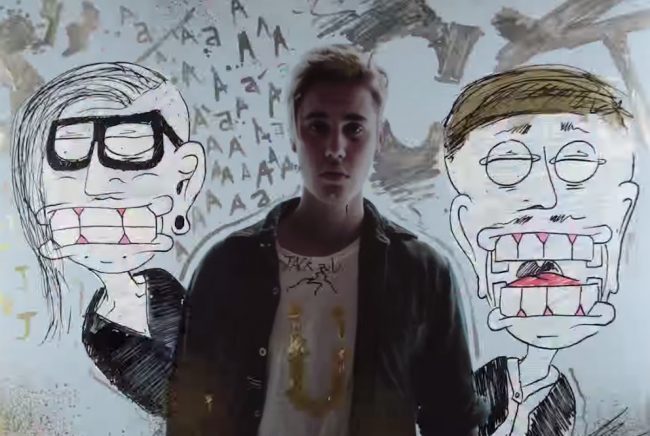Everyone’s Watching: How Justin Bieber Beat the Haters and Made a Great Pop Record
Justin Bieber is a twenty-one year-old multi-millionaire recording artist from Canada with three chart-topping albums under his belt, an arrest record, and a public image as divisive as his former tween hairdo. The case could be made that he is also the most universally hated figure of pop culture, second maybe to our critical punching bag, Nickelback. To profess an interest in his music in a public place is to perhaps suck the wind out of the room. Unless you are the millions of fans around the world who buy his music and the tickets to his shows, you are no longer legitimate or relevant as a tasteful cultural consumer if you actually like Justin Bieber.
How is this possible? How is he so hated, yet so commercially successful?
While listening to Justin’s fourth major label studio album, Purpose, I thought of other colossal musician-moguls with damning reputations and skyscraping album sales. Kanye West, for one. But unlike Kanye, Justin has never had the critical clout to rely on when the chorus of haters warms up. Purpose is Justin taking one step closer to that position of radical empowerment. The haters are going to hate, as that other colossus says, but for the first time in his career, Justin has a solid album to fall back on.
When discussing Purpose, you are as likely to hear the word “mature” as you are to hear talk of Justin lyrically defending his actions in light of so much media scrutiny. “Mark my words, that’s all that I have,” he sings on the opening track, and though the song can be read as an affirmation of doing right to some anonymous love interest, it – along with the album entire – is ultimately an open letter of support to himself. It also charts his love-hate relationship with the media machine that has made him who he is. On “The Feeling,” he sings: “You give to me/ Everything, anything that I could dream/ And at least that’s what it seems/ Could it be I don’t know what’s good for me?” These moments of doubt and confession are everywhere on the album.
It challenges our belief in a capitalist society to pity a bawling king upon his throne, especially when the media runs off the tears of such figures. We are to mock them, right? How can someone so rich and with so much influence be pitied? Doesn’t wealth promise deliverance from the woes of life?
The answer is: it is hard to say with Justin. As someone thrust into the limelight at such a young age, Justin has lived outside the structures of “normal” society for years, but as a media spectacle, he also really hasn’t. This is a person whose every move is watched by the greater eyes of social and mainstream media. These outlets wait for him to trip up. Never mind if an album is musically appealing. The media channels want his blood.
And on Purpose, we find Justin cluing us into his everyday life as a spectacle and then confidently asserting his actions. “Mark My Words” is the name of the opening track, which is then followed by “I’ll Show You” – two major statements of independence and dynamism. Both reveal Justin staking his claim not as the best artist of all time but as a flesh-and-blood human. “My life is a movie and everyone’s watching/ So let’s get to the good part and past all the nonsense,” he sings on “I’ll Show You” and then goes on to illustrate the reality of being in his unique position as the bag of trash we collectively kick around to air out our own day-to-day frustrations.
Musically, though, Purpose is more impressive for what it isn’t than for what it is. The most obvious points of influence range from The Weeknd’s codeine-drip boasts to that beloved clean-cut crooner, Justin Timberlake. For the album, Justin chose not to jump on the 80s-appropriation bandwagon and instead go for club synths, Afrobeat, and the off-kilter vocal squawks styled after contemporary producers Arca and Ariel Rechtshaid. Most of the big-budget synth stabs can be credited to Skrillex, whose name covers nearly half the album. Skrillex foregoes the bloated explosions of brostep and instead provides Justin with widescreen moments of twisted vocal samples and clap happy club beats.
the album. Skrillex foregoes the bloated explosions of brostep and instead provides Justin with widescreen moments of twisted vocal samples and clap happy club beats.
The sickly-sweet love anthems of his previous albums are nowhere to be found here, indicating his transition from a tween poptimist to something else – an older, wiser artist in a position to shake things up a bit. After being at the receiving end of the media bullwhip, it seems his music can now speak for itself while also serving as an accompaniment to his recently-discussed struggle with depression. “People thought it was funny to poke [Amy Winehouse] when she was at rock bottom, to keep pushing her down until she had no more of herself,” Justin recently told NME. “And that’s what they were trying to do to me.”
In the midst of the hype and the hate, Justin has produced a soaring pop record, complete with all the insecurities, self-loathing, and complexities that reveal him as the young human artist he is. Regardless of his net worth or his time spent serving probation, Justin has finally given us something with artistic heft – an inside look at what happens when the cameras turn off.


